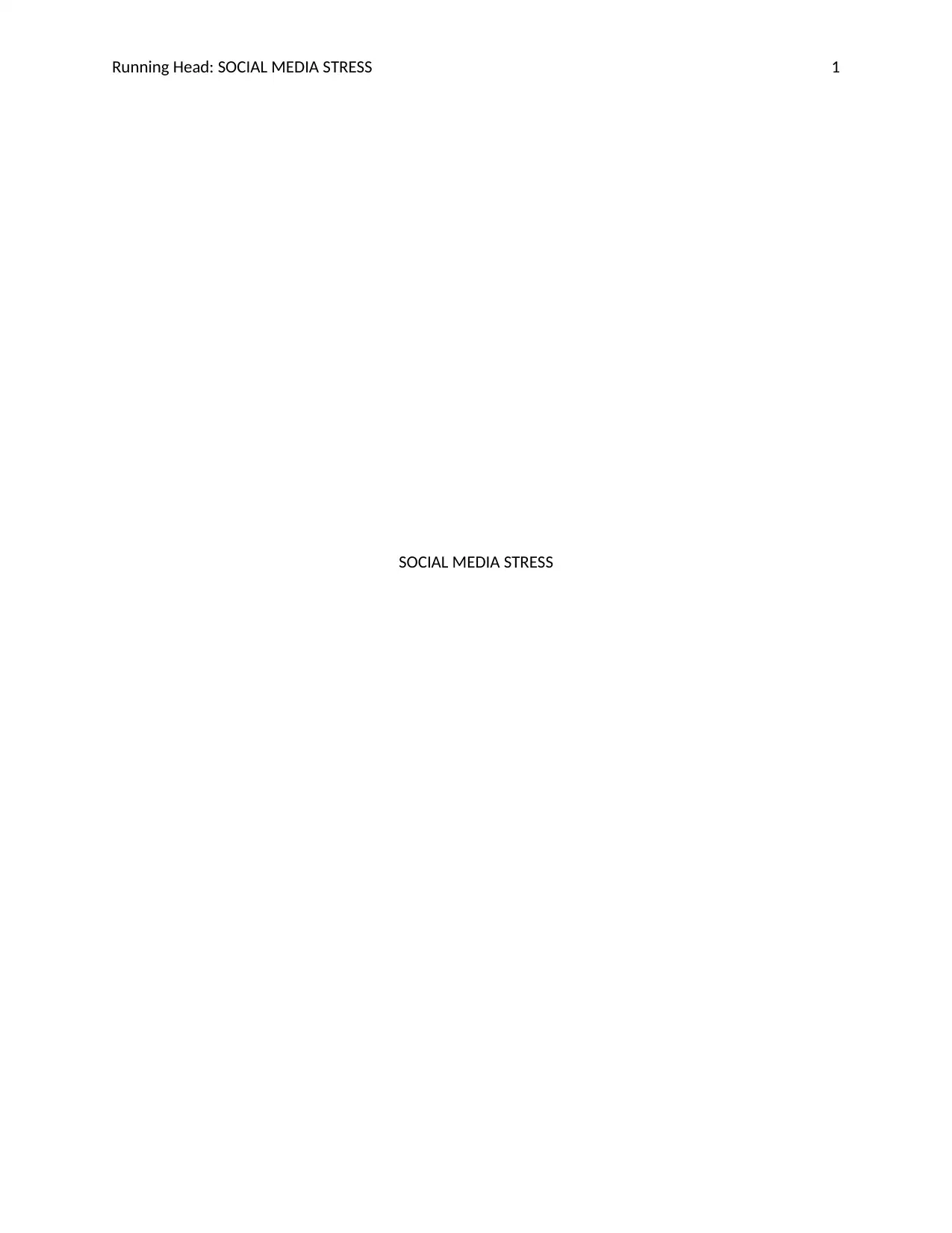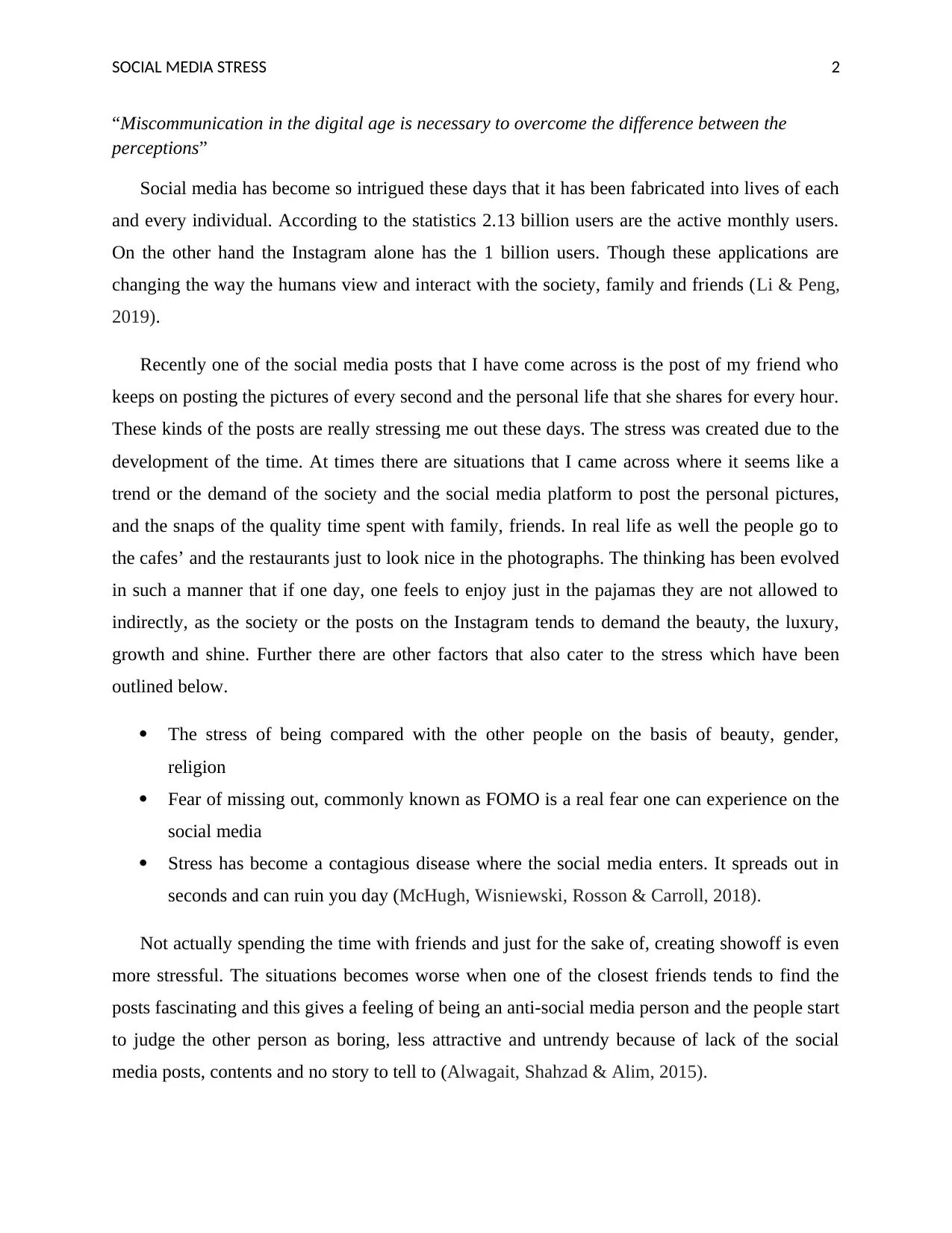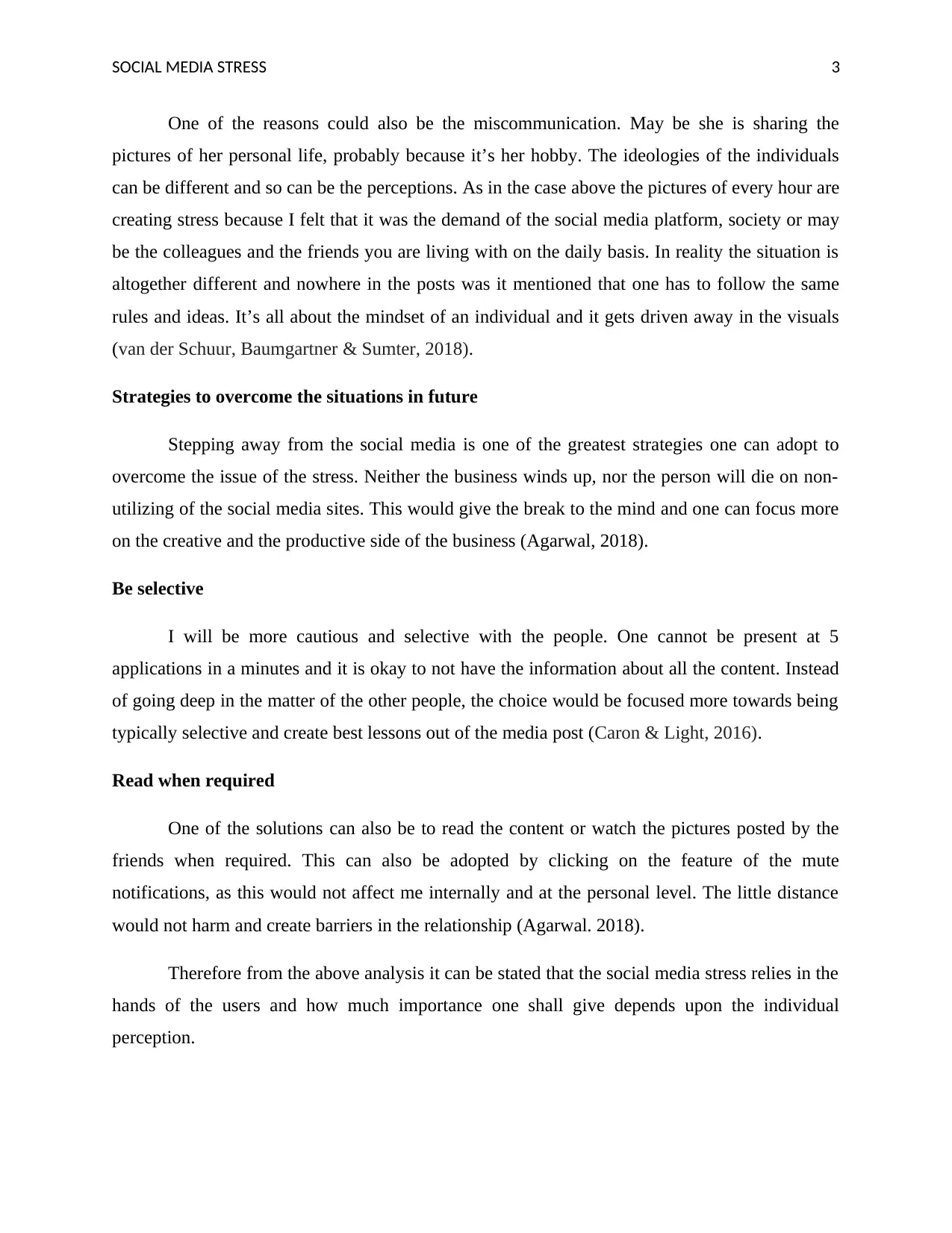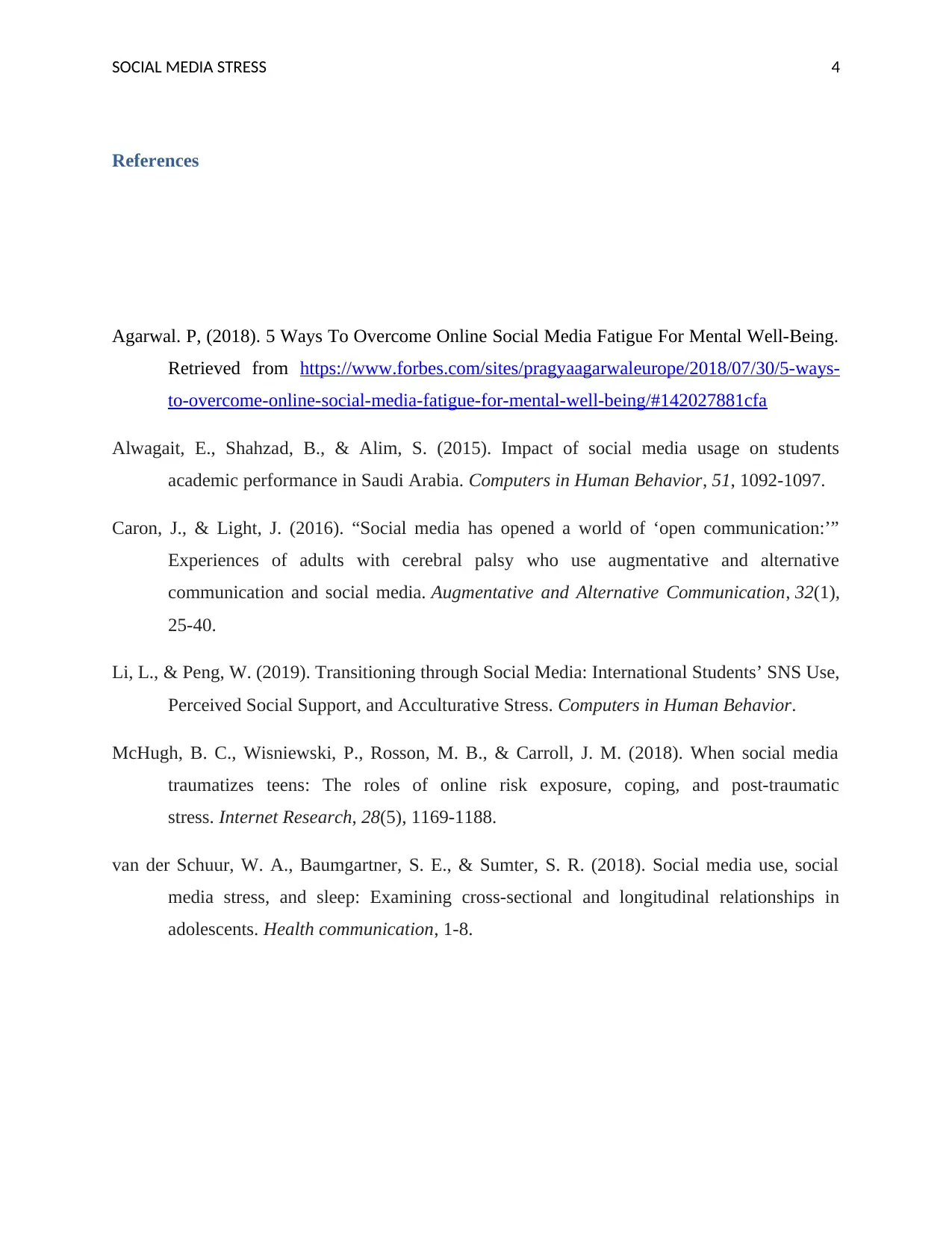Social Media Stress and Miscommunication Report - PSYC 1130
VerifiedAdded on 2023/01/18
|4
|1135
|52
Report
AI Summary
This report examines the increasing prevalence of social media stress and miscommunication in the digital age. The author analyzes a personal experience involving a friend's social media posts, which led to feelings of stress due to perceived societal pressures and the fear of missing out (FOMO). The report identifies factors contributing to this stress, including comparisons with others, the contagious nature of online stress, and the potential for miscommunication. To overcome these issues, the author suggests strategies such as stepping away from social media, being selective with content consumption, and muting notifications to maintain a healthy perspective. The conclusion emphasizes that managing social media stress is largely dependent on individual perception and proactive strategies.

Running Head: SOCIAL MEDIA STRESS 1
SOCIAL MEDIA STRESS
SOCIAL MEDIA STRESS
Paraphrase This Document
Need a fresh take? Get an instant paraphrase of this document with our AI Paraphraser

SOCIAL MEDIA STRESS 2
“Miscommunication in the digital age is necessary to overcome the difference between the
perceptions”
Social media has become so intrigued these days that it has been fabricated into lives of each
and every individual. According to the statistics 2.13 billion users are the active monthly users.
On the other hand the Instagram alone has the 1 billion users. Though these applications are
changing the way the humans view and interact with the society, family and friends (Li & Peng,
2019).
Recently one of the social media posts that I have come across is the post of my friend who
keeps on posting the pictures of every second and the personal life that she shares for every hour.
These kinds of the posts are really stressing me out these days. The stress was created due to the
development of the time. At times there are situations that I came across where it seems like a
trend or the demand of the society and the social media platform to post the personal pictures,
and the snaps of the quality time spent with family, friends. In real life as well the people go to
the cafes’ and the restaurants just to look nice in the photographs. The thinking has been evolved
in such a manner that if one day, one feels to enjoy just in the pajamas they are not allowed to
indirectly, as the society or the posts on the Instagram tends to demand the beauty, the luxury,
growth and shine. Further there are other factors that also cater to the stress which have been
outlined below.
The stress of being compared with the other people on the basis of beauty, gender,
religion
Fear of missing out, commonly known as FOMO is a real fear one can experience on the
social media
Stress has become a contagious disease where the social media enters. It spreads out in
seconds and can ruin you day (McHugh, Wisniewski, Rosson & Carroll, 2018).
Not actually spending the time with friends and just for the sake of, creating showoff is even
more stressful. The situations becomes worse when one of the closest friends tends to find the
posts fascinating and this gives a feeling of being an anti-social media person and the people start
to judge the other person as boring, less attractive and untrendy because of lack of the social
media posts, contents and no story to tell to (Alwagait, Shahzad & Alim, 2015).
“Miscommunication in the digital age is necessary to overcome the difference between the
perceptions”
Social media has become so intrigued these days that it has been fabricated into lives of each
and every individual. According to the statistics 2.13 billion users are the active monthly users.
On the other hand the Instagram alone has the 1 billion users. Though these applications are
changing the way the humans view and interact with the society, family and friends (Li & Peng,
2019).
Recently one of the social media posts that I have come across is the post of my friend who
keeps on posting the pictures of every second and the personal life that she shares for every hour.
These kinds of the posts are really stressing me out these days. The stress was created due to the
development of the time. At times there are situations that I came across where it seems like a
trend or the demand of the society and the social media platform to post the personal pictures,
and the snaps of the quality time spent with family, friends. In real life as well the people go to
the cafes’ and the restaurants just to look nice in the photographs. The thinking has been evolved
in such a manner that if one day, one feels to enjoy just in the pajamas they are not allowed to
indirectly, as the society or the posts on the Instagram tends to demand the beauty, the luxury,
growth and shine. Further there are other factors that also cater to the stress which have been
outlined below.
The stress of being compared with the other people on the basis of beauty, gender,
religion
Fear of missing out, commonly known as FOMO is a real fear one can experience on the
social media
Stress has become a contagious disease where the social media enters. It spreads out in
seconds and can ruin you day (McHugh, Wisniewski, Rosson & Carroll, 2018).
Not actually spending the time with friends and just for the sake of, creating showoff is even
more stressful. The situations becomes worse when one of the closest friends tends to find the
posts fascinating and this gives a feeling of being an anti-social media person and the people start
to judge the other person as boring, less attractive and untrendy because of lack of the social
media posts, contents and no story to tell to (Alwagait, Shahzad & Alim, 2015).

SOCIAL MEDIA STRESS 3
One of the reasons could also be the miscommunication. May be she is sharing the
pictures of her personal life, probably because it’s her hobby. The ideologies of the individuals
can be different and so can be the perceptions. As in the case above the pictures of every hour are
creating stress because I felt that it was the demand of the social media platform, society or may
be the colleagues and the friends you are living with on the daily basis. In reality the situation is
altogether different and nowhere in the posts was it mentioned that one has to follow the same
rules and ideas. It’s all about the mindset of an individual and it gets driven away in the visuals
(van der Schuur, Baumgartner & Sumter, 2018).
Strategies to overcome the situations in future
Stepping away from the social media is one of the greatest strategies one can adopt to
overcome the issue of the stress. Neither the business winds up, nor the person will die on non-
utilizing of the social media sites. This would give the break to the mind and one can focus more
on the creative and the productive side of the business (Agarwal, 2018).
Be selective
I will be more cautious and selective with the people. One cannot be present at 5
applications in a minutes and it is okay to not have the information about all the content. Instead
of going deep in the matter of the other people, the choice would be focused more towards being
typically selective and create best lessons out of the media post (Caron & Light, 2016).
Read when required
One of the solutions can also be to read the content or watch the pictures posted by the
friends when required. This can also be adopted by clicking on the feature of the mute
notifications, as this would not affect me internally and at the personal level. The little distance
would not harm and create barriers in the relationship (Agarwal. 2018).
Therefore from the above analysis it can be stated that the social media stress relies in the
hands of the users and how much importance one shall give depends upon the individual
perception.
One of the reasons could also be the miscommunication. May be she is sharing the
pictures of her personal life, probably because it’s her hobby. The ideologies of the individuals
can be different and so can be the perceptions. As in the case above the pictures of every hour are
creating stress because I felt that it was the demand of the social media platform, society or may
be the colleagues and the friends you are living with on the daily basis. In reality the situation is
altogether different and nowhere in the posts was it mentioned that one has to follow the same
rules and ideas. It’s all about the mindset of an individual and it gets driven away in the visuals
(van der Schuur, Baumgartner & Sumter, 2018).
Strategies to overcome the situations in future
Stepping away from the social media is one of the greatest strategies one can adopt to
overcome the issue of the stress. Neither the business winds up, nor the person will die on non-
utilizing of the social media sites. This would give the break to the mind and one can focus more
on the creative and the productive side of the business (Agarwal, 2018).
Be selective
I will be more cautious and selective with the people. One cannot be present at 5
applications in a minutes and it is okay to not have the information about all the content. Instead
of going deep in the matter of the other people, the choice would be focused more towards being
typically selective and create best lessons out of the media post (Caron & Light, 2016).
Read when required
One of the solutions can also be to read the content or watch the pictures posted by the
friends when required. This can also be adopted by clicking on the feature of the mute
notifications, as this would not affect me internally and at the personal level. The little distance
would not harm and create barriers in the relationship (Agarwal. 2018).
Therefore from the above analysis it can be stated that the social media stress relies in the
hands of the users and how much importance one shall give depends upon the individual
perception.
⊘ This is a preview!⊘
Do you want full access?
Subscribe today to unlock all pages.

Trusted by 1+ million students worldwide

SOCIAL MEDIA STRESS 4
References
Agarwal. P, (2018). 5 Ways To Overcome Online Social Media Fatigue For Mental Well-Being.
Retrieved from https://www.forbes.com/sites/pragyaagarwaleurope/2018/07/30/5-ways-
to-overcome-online-social-media-fatigue-for-mental-well-being/#142027881cfa
Alwagait, E., Shahzad, B., & Alim, S. (2015). Impact of social media usage on students
academic performance in Saudi Arabia. Computers in Human Behavior, 51, 1092-1097.
Caron, J., & Light, J. (2016). “Social media has opened a world of ‘open communication:’”
Experiences of adults with cerebral palsy who use augmentative and alternative
communication and social media. Augmentative and Alternative Communication, 32(1),
25-40.
Li, L., & Peng, W. (2019). Transitioning through Social Media: International Students’ SNS Use,
Perceived Social Support, and Acculturative Stress. Computers in Human Behavior.
McHugh, B. C., Wisniewski, P., Rosson, M. B., & Carroll, J. M. (2018). When social media
traumatizes teens: The roles of online risk exposure, coping, and post-traumatic
stress. Internet Research, 28(5), 1169-1188.
van der Schuur, W. A., Baumgartner, S. E., & Sumter, S. R. (2018). Social media use, social
media stress, and sleep: Examining cross-sectional and longitudinal relationships in
adolescents. Health communication, 1-8.
References
Agarwal. P, (2018). 5 Ways To Overcome Online Social Media Fatigue For Mental Well-Being.
Retrieved from https://www.forbes.com/sites/pragyaagarwaleurope/2018/07/30/5-ways-
to-overcome-online-social-media-fatigue-for-mental-well-being/#142027881cfa
Alwagait, E., Shahzad, B., & Alim, S. (2015). Impact of social media usage on students
academic performance in Saudi Arabia. Computers in Human Behavior, 51, 1092-1097.
Caron, J., & Light, J. (2016). “Social media has opened a world of ‘open communication:’”
Experiences of adults with cerebral palsy who use augmentative and alternative
communication and social media. Augmentative and Alternative Communication, 32(1),
25-40.
Li, L., & Peng, W. (2019). Transitioning through Social Media: International Students’ SNS Use,
Perceived Social Support, and Acculturative Stress. Computers in Human Behavior.
McHugh, B. C., Wisniewski, P., Rosson, M. B., & Carroll, J. M. (2018). When social media
traumatizes teens: The roles of online risk exposure, coping, and post-traumatic
stress. Internet Research, 28(5), 1169-1188.
van der Schuur, W. A., Baumgartner, S. E., & Sumter, S. R. (2018). Social media use, social
media stress, and sleep: Examining cross-sectional and longitudinal relationships in
adolescents. Health communication, 1-8.
1 out of 4
Related Documents
Your All-in-One AI-Powered Toolkit for Academic Success.
+13062052269
info@desklib.com
Available 24*7 on WhatsApp / Email
![[object Object]](/_next/static/media/star-bottom.7253800d.svg)
Unlock your academic potential
Copyright © 2020–2026 A2Z Services. All Rights Reserved. Developed and managed by ZUCOL.





